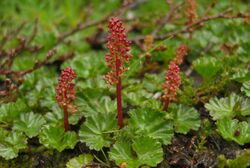Biology:Gunnera magellanica
| Gunnera magellanica | |
|---|---|

| |
| Scientific classification | |
| Kingdom: | Plantae |
| Clade: | Tracheophytes |
| Clade: | Angiosperms |
| Clade: | Eudicots |
| Order: | Gunnerales |
| Family: | Gunneraceae |
| Genus: | Gunnera |
| Species: | G. magellanica
|
| Binomial name | |
| Gunnera magellanica Lam.
| |
Gunnera magellanica is a perennial rhizomatous dioeceous herb native to Chile ,[1] Argentina and the Falkland Islands, and Andean areas of Peru, Ecuador.[2] In the southern part of its range it grows in damper parts of the Magellanic subpolar forests and Valdivian temperate forests,[3] and shrub formations on Tierra del Fuego, with an altitudinal range from sea level to 1500m.
Description
Unlike its congeners, G. tinctoria and G. manicata, the leaves are small, approximately 6 cm across. They are rounded or kidney-shaped, stipulate on long (2–10 cm) petioles, with crenate edges.
Flowers are unisexual, with female inflorescences shorter than male ones. The fruit is a bright red berry (drupe) 3–5 mm in diameter.
The leaves die back in the austral autumn, so G. magellanica perennates as under-ground rhizomes, and is therefore classified as a cryptophyte.
Taxonomy
Gunnera magellanica was first described Jean-Baptiste Lamarck in Encyclopédie Méthodique, Botanique 3: 61, t. 801, f. 2. 1789.[4]
Gunnera: the generic name honours the Norway botanist and bishop Johan Ernst Gunnerus.
magellanica: geographical epithet referring to its distribution in proximity to the Magellan Straits.
- Gunnera falklandica Hook.
- Gunnera integrifolia Blume
- Gunnera plicata Vahl
- Gunnera reniformis Gay ex Blume
- Misandra magellanica (Lam.) J.F. Gmel. [5]
In popular culture
Vernacular Names
Vernacular names are Frutilla del Diablo in Spanish, and in English on the Falkland Islands it is called Pigvine or Pig Vine.[6]
Garden plant
Gardeners in English-speaking countries know it as baby gunnera, devil's strawberry (probably a direct translation of the Spanish name) or dwarf rhubarb. As a garden plant G. magellanica can be used as ground cover, but is sometimes invasive. It rarely fruits as it is dioecious and both male and female plants are needed.[7]
Stamps
G. magellanica featured on the 1½ d. stamp of the 1968 "Floral Issue" of Falkland Island postage stamps.[8]
References
- ↑ Reiche, Karl (1898). Flora de Chile. 2. Santiago de Chile: Imprenta Cervantes. pp. 273–274. OCLC: 12918229.
- ↑ GBIF Backbone Taxonomy (2013-07-01). "Gunnera magellanica". The Global Biodiversity Information Facility. https://www.gbif.org/species/3723590. Retrieved 2014-12-12.
- ↑ https://explorer.natureserve.org/Taxon/ELEMENT_GLOBAL.2.884818/Valdivian_Temperate_Flooded_Swamp_Forest_Macrogroup
- ↑ "Gunnera magellanica". Tropicos.org. Missouri Botanical Garden. http://www.tropicos.org/Name/15000001. Retrieved 2013-02-01.
- ↑ "Gunnera magellanica". World Checklist of Selected Plant Families. http://apps.kew.org/wcsp/namedetail.do?name_id=370416. Retrieved 2013-02-01.
- ↑ Bernadette Hince (10 November 2000). The Antarctic Dictionary: A Complete Guide to Antarctic English. Csiro Publishing. p. 263. ISBN 978-0-643-10232-3. https://books.google.com/books?id=upcoFJXWT38C&pg=PT835.
- ↑ Alpine Garden Society. "Gunnera magellanica". Alpine Garden Society. http://encyclopaedia.alpinegardensociety.net/plants/Gunnera/magellanica. Retrieved 2014-12-12.
- ↑ http://www.stamptraders.com/falkland/Gallary5.html
Bibliography
- Foster, R. C. 1958. A catalogue of the ferns and flowering plants of Bolivia. Contr. Gray Herb. 184: 1–223.
- Jørgensen, P. M. & C. Ulloa Ulloa. 1994. Seed plants of the high Andes of Ecuador---A checklist. AAU Rep. 34: 1–443.
- Jørgensen, P. M. & S. León-Yánez. (eds.) 1999. Catalogue of the vascular plants of Ecuador. Monogr. Syst. Bot. Missouri Bot. Gard. 75: i–viii, 1–1181.
- Luteyn, J. L. 1999. Páramos, a checklist of plant diversity, geographical distribution, and botanical literature. Mem. New York Bot. Gard. 84: viii–xv, 1–278.
- Macbride, J. F. 1959. Haloragaceae, Flora of Peru. Publ. Field Mus. Nat. Hist., Bot. Ser. 13(5/1): 3–8.
- Marticorena, C. & M. Quezada. 1985. Catálogo de la Flora Vascular de Chile. Gayana, Bot. 42: 1–157.
- Mora-Osejo, L. 1984. Haloragaceae. 3: 1–178. In P. Pinto-Escobar & P. M. Ruiz (eds.) Fl. Colombia. Universidad Nacional de Colombia, Santafé de Bogotá.
- Zuloaga, F. O., O. Morrone, M. J. Belgrano, C. Marticorena & E. Marchesi. (eds.) 2008. Catálogo de las Plantas Vasculares del Cono Sur (Argentina, Sur de Brasil, Chile, Paraguay y Uruguay). Monogr. Syst. Bot. Missouri Bot. Gard. 107(1): i–xcvi, 1–983; 107(2): i–xx, 985–2286; 107(3): i–xxi, 2287–3348.
External links
- Reiche's Flora de Chile, account of Genus Gunnera (pdf) at eFloras.
- Gunnera magellanica at Shoot Gardening.
- Gunnera magellanica at Enciclopedia de la Flora Chileana.
- Gunnera magellanica at the Alpine Garden Society Plant Encyclopedia.
Wikidata ☰ Q5889297 entry
 |

